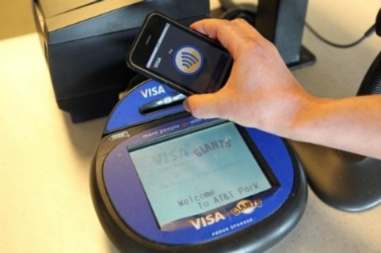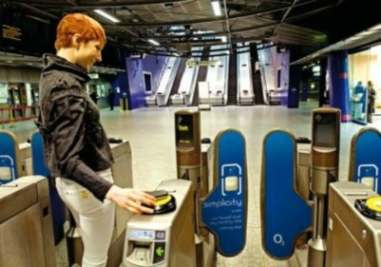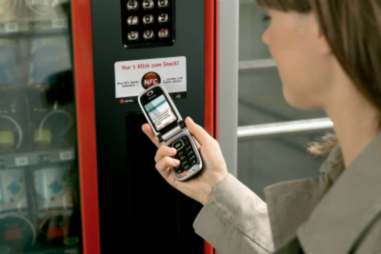Near Field Communications: Leave your leather wallet at home.
 Imagine you get on the local subway for the commute home and instead of paying your fare with money, you simply swipe your phone over a device mounted at the entrance. What is taking place in this setting is a tiny chip in your phone is being activated and scanned by a "reader" device that sends your data via encrypted transmission to a processing service. The result is an instant and hands-free method to pay for services or goods using your phone or other mobile device like a tablet or laptop.
Imagine you get on the local subway for the commute home and instead of paying your fare with money, you simply swipe your phone over a device mounted at the entrance. What is taking place in this setting is a tiny chip in your phone is being activated and scanned by a "reader" device that sends your data via encrypted transmission to a processing service. The result is an instant and hands-free method to pay for services or goods using your phone or other mobile device like a tablet or laptop.
Near Field Communications or NFC is the official and technical term for the scenario presented above. NFC is an evolution of the technology used to create RFID tags and contactless payment systems. Near Field Communication (NFC), has gotten a huge boost from Apple, Microsoft, and Google interest recently and from Verifone which has decided it will build NFC capability into every new POS device it manufactures. Verifone is a retail point of sale giant responsible for a lot of those devices used to swipe your credit cards. Nokia, Sony, and Royal Philips Electronics founded the NFC Forum in 2004 in order to promote the short-range wireless technology. Samsung, Motorola, and more than 140 other organizations all joined the movement shortly after.
"The variety of uses for NFC is limited only by imagination at this point. Because of the way the technology works, the mobile device can  act as a passive card in one instance and also as an active reader in another." says Sarah from Retrevo. They are one of the largest, most trusted consumer electronics shopping and review sites in the world, helping shoppers decide what gadgets to buy, when to buy, and where to buy them.
act as a passive card in one instance and also as an active reader in another." says Sarah from Retrevo. They are one of the largest, most trusted consumer electronics shopping and review sites in the world, helping shoppers decide what gadgets to buy, when to buy, and where to buy them.
Contractless payments are the main use for NFC in development, and referred to as the Digital Wallet or Mobile Wallet concept in payments. The theory behind the mobile wallet is that your phone holds all the same information, in digital form, which your wallet currently holds. It not only replaces your debit and credit cards, but your loyalty cards, coupons, and receipts. AT&T, Verizon and T-Mobile have joined together to form Isis, a collaborative venture that includes several major banks. Barclaycard will be the first to issue customers with an Isis enabled bank account. Sprint is planning to launch its NFC enabled payment service in late 2011, while Isis is planning on 2012. Samsung and Visa have plans to introduce the Samsung Olympic/Paralympics Games handset at the 2012 Olympics. It will allow consumers at the 2012 Summer Games to make contactless payments at over 60,000 locations. The newest name buzzing around the NFC flower garden is Google, and the announcement of the Google Wallet. Google has brought with them a staggering amount of brands: Bloomingdale's, Foot Locker, Macy's, RadioShack, Subway, Toys "R" Us and Walgreens just to name a few. Google Wallet is accepted at over 124,000 PayPass-enabled merchants in the United States and more than 311,000 worldwide.
Unlike many other wireless technologies, NFC has a short range of about one to four inches. This makes it a good choice for secure transactions, such as credit card payments. In today's travel landscape, NFC holds immense relevance for the airline, railway, hospitality and rental car industries, since they can be used anywhere the customer needs to make a purchase. NFC is already being used for the German rail system and the bus system in Madrid. NFC is also very common in Japan and South Korea and has been for awhile, phones function as both ID and wallet. This includes situations where one would otherwise reach for a credit card, a loyalty program card, a passport or driver's license, a pre-paid card, a coupon, or an incentive voucher. In terms of using NFC for coupons/vouchers, the paperless aspect of NFC technology is sure to catch on, as consumers no longer have to worry about paper clippings and losing tangible objects. Not only does this technology make a lot more environmental-sense, the added consumer-convenience makes it more likely that customers will use the coupon or voucher.
Think of NFC uses in the Health Care system to provide medical professionals with information about what treatments a patient should receive. They can also keep track of when nurses and doctors have checked in with that patient and when. It is also easy to use can be attached or embedded into objects, thus creating "smart" objects with more information than normal. The biggest area that will be used second to purchases will be Social Media... Gotwalla, Groupon, FourSquare, and Facebook are already being used extensively. Imagine not having to manually "check-in" at locations that you and your friends visit. Their respective statuses would automatically be updated (for example, "I just met so and so") and they could choose to include their location ("I just met so and so at this bar"). We truly are a fully connected world.
 A key question about these new devices is whether the phones can communicate confidential financial data securely. The thought of a device that carries all of your personal and financial information is a frightening when you think about how vulnerable that device is to theft or loss. Google thinks the security issue is not really an issue at all. Current security features included in Android devices would use a multi-layer data encryption between Google Wallet and MasterCard PayPass, and requires a PIN entry at each purchase, and the separate lock available on Android phones. Don't worry if your phone doesn't come with the NFC chip. It can be integrated via the SD/SIM cards. It can also be added into cases, for devices like the iPhone which does not support either SIM/SD cards at this time.
A key question about these new devices is whether the phones can communicate confidential financial data securely. The thought of a device that carries all of your personal and financial information is a frightening when you think about how vulnerable that device is to theft or loss. Google thinks the security issue is not really an issue at all. Current security features included in Android devices would use a multi-layer data encryption between Google Wallet and MasterCard PayPass, and requires a PIN entry at each purchase, and the separate lock available on Android phones. Don't worry if your phone doesn't come with the NFC chip. It can be integrated via the SD/SIM cards. It can also be added into cases, for devices like the iPhone which does not support either SIM/SD cards at this time.
The trick for NFC providers will be digging through the reams of "data" produced by the transactions to deliver offerings targeted at addressing situational needs, and revolutionize how customers are targeted. Surveys of manufacturers of NFC-based mobile devices and their partners suggest that we could see up to 300 million handsets in use, and NFC-based payments reaching a staggering $50 billion within the next three years. NFC is changing the digital landscape and is a multi-billion dollar industry for the major banks, NFC providers, and security researchers. Keep track of those receipts.
{jcomments on}
Was this article useful? Subscribe to our weekly(ish) email newsletter to receive more great articles about bar code technology.
Follow us on Twitter to get daily updates: Barcode.com on Twitter
Other articles that may interest you:
Phone Replaces Wallet at Point of Sale
Juniper Research Projects Mobile Payments to Reach $630bn by 2014
